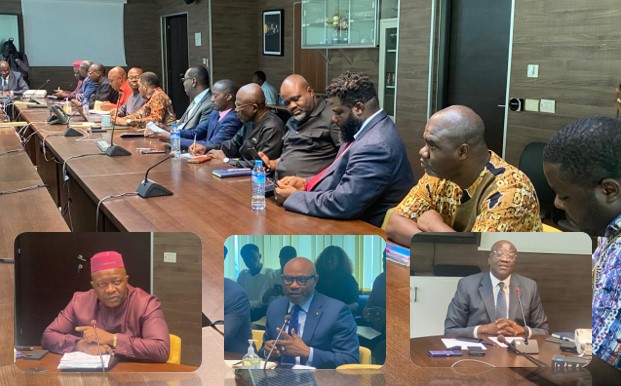Liberia’s central bank unveils nationwide electronic switch to drive digital economy revolution

The Central Bank of Liberia (CBL) has announced the upcoming launch of a nationwide electronic payment switch, a move hailed as a transformative step toward financial inclusion, operational efficiency, and the digital modernization of the country’s economy.
Speaking at the CBL headquarters in Monrovia during the Monetary Policy Committee (MPC) communiqué presentation, Executive Governor Henry F. Saamoi declared the project a “game-changer” for Liberia’s financial ecosystem.
“We can’t be left behind,” Saamoi stated. “We’re coming to the table late, but we have to get there.”
Expected to be fully operational by December 2025, the electronic switch will act as a centralized digital hub, enabling seamless electronic transactions between banks, mobile money platforms, and other financial service providers.
The infrastructure will facilitate interoperability, allowing customers to use one payment card or tool across all ATMs and point-of-sale (POS) terminals nationwide.
“Currently, if I have a card issued by Ecobank and their ATM is down, I can’t use it on LBDI’s ATM,” Saamoi explained. “The switch will bridge that gap—so one card can work everywhere. That’s the ecosystem we are building.”
Beyond convenience, the switch promises to improve transparency by enabling real-time visibility into transactions and financial data.
“If everyone has access to digital services, why should someone travel from Paynesville to Sinkor just to make a transaction? You should be able to do that from your phone, at home,” Saamoi said.
The shift toward a cash-light economy is part of Liberia’s broader strategy to modernize its financial sector. While the country is not yet ready for a fully cashless model, the CBL is laying the groundwork by minimizing physical cash use and reallocating human resources toward more strategic banking services.
The MPC also confirmed that the policy rate will remain at 17.25%, maintaining the current reserve requirement ratios for both Liberian and U.S. dollar deposits.
The committee cited improved inflation rates and relative exchange rate stability, while cautioning against external vulnerabilities.
“We must execute. We must deliver. And we must deliver on time,” said Finance Minister Augustine Ngafuan, who emphasized coordination between monetary and fiscal policies.
He also praised the launch of the Pan-African Payment and Settlement System (PAPSS), enabling cross-border payments in local currencies without reliance on the U.S. dollar.
“If someone in Liberia can pay for goods in Ghana without U.S. dollars, that’s not just convenience—it’s transformation,” Ngafuan added.
Olalekan Balogun, President of the Liberia Bankers Association, welcomed the announcement, saying, “It’s unthinkable that Liberia hasn’t implemented this already.
” He emphasized that both Liberian and U.S. dollars should be compatible with PAPSS and urged stronger digital adoption.
“Digitization helps fight corruption. You can trace every payment,” Balogun noted. “We, the banks, are ready to support. We’re like conjoined twins with the CBL. But let’s push each other forward—this system must work.”
About The Author
dailymailafric
I am an avid African news observer, and an active member of Daily Mail Africa.
I’m Passionate about staying informed on diverse topics across the continent,
I actively contribute to publishing on political, economic and cultural developments in Africa.



